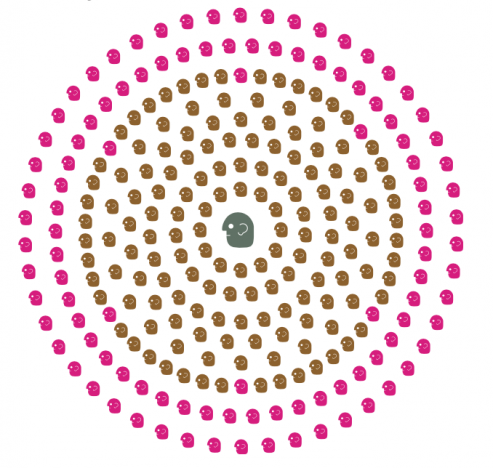Current context:
Current Context:
People with mental health issues are ending up in the prison system due to a lack of access to appropriate services in the community. In 2020, the Mental Health Commission criticised an ‘almost total absence’ of community supports such as crisis houses, intensive care high support units, rehabilitation high support units and specialist rehabilitation units in each mental health area.[371]
In PIPS 2019, IPRT recommended that a high-level cross-departmental and cross-agency Task Force on Mental Health and Imprisonment should be established, with a focus on progressing short-, medium- and long-term solutions.[372] To this end, IPRT strongly welcomes the inclusion of a commitment in the Programme for Government to: Establish a high-level cross-departmental and cross-agency taskforce to consider the mental health and addiction challenges of those imprisoned and primary care support on release.[373]
The Task Force should have a particular focus on identifying and addressing gaps in legislation and community supports to support increased diversion of people with a mental health need away from the criminal justice system. It should also consider the need for additional mental health supports for the prison population, particularly given the impact of restricted regimes and Covid-19 in 2020.
A number of relevant initiatives are outlined in the new National Mental Health Policy, Sharing the Vision: A Mental Health Policy for Everyone.[374] These include: the development of the new mental health facility in Portrane; the endorsement of the New Connections[375] report, including talking therapies in prisons; and the continued work of the Prison In- Reach Court Liaison Services (PICLS).
Prison In-Reach and Court Liaison Service (PICLS)
From 2006 to 2014, 1,548 people were diverted from the criminal justice system to healthcare settings by the Prison In-Reach and Court Liaison Service (PICLS). 916 diversions were to outpatient settings, 436 related to general psychiatric hospitals and 196 were admitted to the Central Mental Hospital.[376] From 2015-2019, PICLS arranged almost one-third (47/153) of all admissions to the Central Mental Hospital and a further 191 admissions to general psychiatric hospitals.[377]
Since 2016, PICLS Cloverhill has been part of the Quality Network for Prison Mental Health Services (QNPMHS). The mental health service at Cloverhill Remand Prison has seen an increase in compliance against the QNPMHS standards of 74% to 89% over three cycles.[378] These standards relate to a number of areas including: admission and assessment, case management and treatment, referral, discharge and transfer, patient experience, environment, workforce capacity, workforce training and governance.
Both general admissions and discharges to the Central Mental Hospital have declined in recent years as demonstrated by the information below:[379]

Further analysis is needed on the reasons for this. The National Forensic Mental Health Service currently has two secure forensic beds per 100,000, this compares with 10 secure forensic beds per 100,000 by comparison with other European states.[380]
The development of Intensive Care Rehabilitation Units (ICRUs) in Ireland has been deemed as urgent: ‘in the absence of ICRUs, there will continue to be limited diversion to local services of those charged with minor offences but suffering major mental illness.[381] Provision of four ICRUs was an unfulfilled recommendation in the previous national mental health policy, A Vision for Change.[382] The new national mental health policy outlines that an Intensive Care Rehabilitation Unit (ICRU) will be built, which will have dual registration as an approved centre under the Mental Health Act and the Criminal Law Insanity Act.[383] This will accept persons found Not Guilty by Reason of Insanity who do not require the level of care provided in the Central Mental Hospital. However, the development of three other ICRUs is not contained in current capital plans.[384]
Disability in prison
The new mental health policy also states that the profile of the mental health needs of the prison population needs to be explored to gather prevalence data on autism, intellectual disability and needs relating to addiction and dual diagnosis, stating that this would allow for a more joined-up approach by professionals in delivering care in prison settings.[385] In 2020, IPRT’s research on disabilities in prison looked at prevalence data on disability among the prison population. Some studies suggest the increasing criminalization of people with disabilities, while others point to increasing rates in which people acquire disabilities in prison settings. The research explored the experiences of access to mental health treatment, in which participants felt that there was a lack of access to psychology supports and a lack of alternatives to prison psychiatry.[386]
Incidents of Self-Harm
The second annual report on self-harm by the Irish Prison Service, published in 2020, shows that in 2018, an episode of self-harm was recorded for 4% of the prison population.[387] The rate of self-harm was 5.7 times higher among females than male prisoners. The rate of self-harm was also higher for those on remand than for sentenced prisoners (5.0 compared with 3.7 per 100). Among the sentenced prison population, 28% of self-harm incidents happened amongst those serving sentences of less than a year.
In 45.6% of cases, mental health issues were cited as a primary contributory factor; this predominantly related to the presence of mental disorders (17%) and substance misuse (16%). 32.7% of cases related to ‘environmental’ issues (e.g. accommodation issues/legal issues) and 22.1% to ‘relational’ issues (e.g. difficulties with staff and/or family). ‘Procedural’ issues such as a recent cell move, change in regime or security level were also highlighted in 24.3% of cases. This is an important point, as an evidence review of recidivism and policy responses highlights: “Procedural unfairness communicates disrespect and disregard and leads to further alienation, resistance and noncompliance.”[388]
IPRT welcomes that the Irish Prison Service has stated that the self-harm data will be used to develop a prison-specific approach with leading specialists in the field over the next year.[389]
Mental health and Covid-19
Many have said that the crisis that comes after the Covid-19 pandemic will be that of a mental health crisis.[390] The impact of Covid-19 on the mental health of prisoners has yet to be fully understood, however, this is a key concern raised by prisoner family members.[391] During the first three months of the Covid-19 pandemic (12 March 2020 to 29 June 2020), provisional figures show there were 36 reported incidents of self-harm across the estate. Of these 33 were among the male prison population and three among the female prison population.[392]
At the outset of the pandemic, the Irish Prison Service introduced measures to support the mental health needs of prisoners in the absence of face-to-face psychology supports. This included tele-psychology, which consisted of 20-minute telephone sessions. A national telephone line was also established to allow prisoners access to some services.[393] A total of 550 referrals were received from tele-psychology between 12 March 2020 and 30 June 2020. A total of 891 calls were made to the national helpline to contact chaplaincy, IASIO, psychology or psychiatry services between 11 April and 30 June, of which 135 were made to prison psychology services.[394] There were 180 prisoners seen in a mental health clinic in March 2020, 172 in April 2020 and 203 in May 2020.[395]
In an analysis of journals of cocooning prisoners, a key conclusion by the Office of the Inspector of Prisons and Maynooth University was:
“We need to learn from these perceptions of feeling disadvantaged and punished, and consider how best to alleviate these feelings and prepare, if measures are needed again later, to limit the impact on mental health...”[396]
The Office of the Inspector of Prisons and Maynooth University also called for shorter- and longer-term plans to support all people in custody and staff, as prisons and the country as a whole transition to a ‘new normal’ – considering that, for some, reduced restrictions may heighten their anxiety.[397] Penal Reform International (2020) have also highlighted the need for mental health plans to be put in place:
“Prison administrations should continue to facilitate mental healthcare provision and undertake specific efforts to mitigate negative mental health impacts of COVID-19 measures, including by working with community-based services. Mental health crisis plans, and longer-term mental health provision needs to be prioritised as restrictions ease. Plans should be developed by healthcare staff and developed together with people detained and staff.”[398]
Progressive Practice:
Progressive Practice: Introduction of a Sentencing Guideline when sentencing offenders with mental disorders, developmental disorders, or neurological impairments.[405]
As of 1st October 2020, the Sentencing Council in England and Wales introduced a sentencing guideline to apply when sentencing offenders who, at the time of the offence and/or at the time of sentencing, had a mental disorder.
The guideline states that where an offender has an impairment or disorder it should always be considered by the court. In deciding upon whether the impairment or disorder has any impact on sentencing, the approach to sentencing should be individualistic. The guideline sets out what sentencers should consider in sentencing:
- Some mental disorders can fluctuate and an offender’s state during court proceedings may not be representative of their condition at the time the offence was committed
- An avoidance of assumptions whereby many mental disorders, neurological impairments or developmental disorders are not easily identifiable
- No adverse conclusion should be drawn if an offender had not been formally diagnosed or willing to disclose an impairment or disorder
The guideline also notes the importance of considering relevant cultural, ethnicity and gender considerations of offenders within a mental health context.
Where the offender is or appears to be mentally disordered at the date of sentencing, the court must obtain and consider a medical report before passing a custodial sentence. Where a custodial sentence is passed, the court should forward the relevant reports to prison authorities along with other information relevant to the offender’s physical and mental health.
The main classes of mental health disorders covered under this guideline include psychotic illnesses, such as schizophrenia and bi-polar disorder and non-psychotic illness such as post- traumatic stress disorder and developmental disorders such as intellectual disability, autism, and dementia. Personality disorder is also included in the list of common disorders likely to be relevant in court. While personality disorder affects between 4-11% of the general population, personality disorders are much more prevalent among the prison population, affecting approximately 60-70% of the prison population.[406] This is currently not considered in mental health legislation in Ireland.[407]



